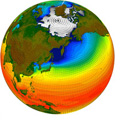


Fall brings the return of school and the end of vacations, but it also marks the start of another season of Science at the Theater talks. The theme for the upcoming series is “Get Smart About Carbon” and begins with a lecture on “Trading Carbon: Can Cookstoves Light the Way?” on Monday, Sept. 20, at 7 p.m. at the Berkeley Repertory Theatre (2025 Addision St.). On Oct. 11, famed energy pioneer Art Rosenfeld will discuss “Cool Cities,” and the Nov. 8 event will focus on “Ten Tips for a Low-Carbon Life.” The series is sponsored by the Friends of Berkeley Lab. More>
 [HPC Source] Increasingly sophisticated supercomputers and networks are changing the way science is done, whether allowing researchers to scrutinize the last 13 billion years of cosmic expansion or to better understand subatomic particles. Meanwhile, advancements in high-performance networks are facilitating remarkable levels of scientific collaborations. These trends are leading to unprecedented scientific productivity and forcing supercomputing centers to re-evaluate how they manage data, writes NERSC's Jason Hick in an editorial for HPC Source magazine. Hick heads the Storage Systems Group at NERSC. More>
[HPC Source] Increasingly sophisticated supercomputers and networks are changing the way science is done, whether allowing researchers to scrutinize the last 13 billion years of cosmic expansion or to better understand subatomic particles. Meanwhile, advancements in high-performance networks are facilitating remarkable levels of scientific collaborations. These trends are leading to unprecedented scientific productivity and forcing supercomputing centers to re-evaluate how they manage data, writes NERSC's Jason Hick in an editorial for HPC Source magazine. Hick heads the Storage Systems Group at NERSC. More>
 In The News: Glenn Seaborg Fund Aids Purchase of Lafayette Ridge
In The News: Glenn Seaborg Fund Aids Purchase of Lafayette Ridge [Contra Costa Times] David Seaborg and his father, Glenn — the Nobel Prize-winning chemist who discovered plutonium and helped usher in the nuclear age — found a common bond hiking in the East Bay hills. Eleven years after Glenn Seaborg died in 1999 at age 86 in his Lafayette home, his son and allies have found a way to honor the senior Seaborg for his work promoting hiking and land preservation. Glenn Seaborg was best known for co-discovering 10 elements as a researcher at Berkeley Lab as well as serving as a UC Berkeley Chancellor and as chairman of the Atomic Energy Commission. More>
 [National Science Foundation] Scientists can now study climate change in far more detail with powerful new computer software released by the National Center for Atmospheric Research in Boulder, Colo. The Community Earth System Model (CESM) will be one of the primary climate models used for the next assessment by the Intergovernmental Panel on Climate Change. Using the CESM, researchers can now simulate the interaction of marine ecosystems with greenhouse gases; the climatic influence of ozone, dust, and other atmospheric chemicals; the cycling of carbon through the atmosphere, oceans, and land surfaces; and the influence of greenhouse gases on the upper atmosphere. More>
[National Science Foundation] Scientists can now study climate change in far more detail with powerful new computer software released by the National Center for Atmospheric Research in Boulder, Colo. The Community Earth System Model (CESM) will be one of the primary climate models used for the next assessment by the Intergovernmental Panel on Climate Change. Using the CESM, researchers can now simulate the interaction of marine ecosystems with greenhouse gases; the climatic influence of ozone, dust, and other atmospheric chemicals; the cycling of carbon through the atmosphere, oceans, and land surfaces; and the influence of greenhouse gases on the upper atmosphere. More>
From a stress management workshop to a diabetes screening at Health Services, the HR Benefits department hosts a number of events to help staff manage their work and life. To assist in tracking upcoming events, the department produces a monthly calendar, and the September edition is now available.
Today
at Berkeley Lab encourages feedback and story ideas
Deadline for submissions is 10 a.m. two days prior to publication
TABL is produced by Public Affairs' Communications Group